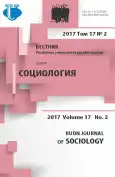Postmulticulturalism: Some approaches to the study of contemporary social and cultural processes
- Authors: Kuropjatnik AI1, Kuropjatnik MS1
-
Affiliations:
- Saint-Petersburg State University
- Issue: Vol 17, No 2 (2017)
- Pages: 145-156
- Section: Theory, Methodology and History of Sociological Research
- URL: https://journal-vniispk.ru/2313-2272/article/view/340494
- DOI: https://doi.org/10.22363/2313-2272-2017-17-2-145-156
- ID: 340494
Cite item
Full Text
Abstract
Postmulticulturalism is a way to conceptualize social and cultural diversity under the globalization. Unlike multiculturalism that developed as a nation-state project postmulticulturalism considers the tendencies of fluidity, processuality, and overcoming institutional constellations and national boundaries. Postmulticulturalism allows a specific vision of contemporary problems, thus contributing to the understanding of the role and functions of the nation state under the globalization, to the redefining of integration in national and transnational contexts, and to the transition to dialogue forms of maintaining social and political unity within the nation. Thereafter the authors consider a ‘postmulticultural turn’ in social sciences, which is associated with managing cultural diversity and allows the nation state to rethink itself in the postmulticultural perspective. Postmulticulturalism contributes to the development of new conceptual and discursive spaces, and to the practical explications of the changing reality under the recurrent transitions between old and new, the past and the future. Postmulticulturalism is a stage in the development of a multicultural ideology aimed at deessentialization of ethnicity and overcoming cultural discrimination. However, it does not deny multiculturalism as a way to conceptualize new social and cultural realities and migration situation in nation states that are supported by various multicultural policies and provide the postmulticultural approach with the impulses for social and cultural dynamics relevant for the contemporary society.
About the authors
A I Kuropjatnik
Saint-Petersburg State University
Author for correspondence.
Email: alkuropjatnik@mail.ru
Universitetskaya Nab., 7/9, Saint-Petersburg, Russia, 191124
M S Kuropjatnik
Saint-Petersburg State University
Email: kuropjatnik@bk.ru
Universitetskaya Nab., 7/9, Saint-Petersburg, Russia, 191124
References
- Giddens E. Nespokoinyi i mogushchestvennyi continent: chto zhdiet Evropu v budushchem? [Тurbulent and Mighty Continent. What Future for Europe?]. Moscow: Izd. dom «Delo»; 2015 (In Russ).
- Наntington S. Stolknovenie tsivilizatsiy [Тhe Clash of Civilizations and the Remaking of World Order]. Moscow: AST; 2005 (In Russ).
- Banting K. Transatlantic convergence? The archaeology of immigrant integration in Canada and Europe. International Journal. 2014;69(1).
- Berry J. Comparative analysis of Canadian multiculturalism policy and the multiculturalism policies of other countries. Psychology in Russia: State of the Art. 2016;9(1).
- Bradley W. Is There a post-multiculturalism? Working Paper Series Studies on Multicultural Societies. 2013;19.
- Bradley W. Multiculturalism beyond culture: Notes on leaving race behind. Working Paper Series Studies on Multicultural Societies. 2014;29.
- Eriksen T.H. Globalization. The Key Concepts. L.—New Delhi: Bloomsbury; 2013.
- Fleras A. Moving positively beyond multiculturalism: Toward a post-multicultural governance of complex diversities in a diversifying Canada. Zeitschrift für Kanada-Studien. 2015;35.
- Fleras A. Multicultural media in a post-multicultural Canada. Global Media Journal. 2015;8(2).
- Goh D. From colonial pluralism to postcolonial multiculturalism: Race, state formation and the question of cultural diversity in Malaysia and Singapore. Sociology Compass. 2008;2/1.
- Ley D. Post-multiculturalism? Research on Immigration and Integration in the Metropolis. Working Paper Series. 2005;5—18.
- Meer N., Modood T. How does interculturalism contrast with multiculturalism? Journal of Intercultural Studies. 2012;33(2).
- Mishra S., Kumar C.B. Understanding diversity: A multicultural perspective. IOSR Journal of Humanities and Social Science. 2014;19(9).
- Modood T. Post-immigration ‘difference’ and integration: the case of Muslims in Western Europe. A Report prepared for the British Academy. New Paradigms in Public Policy. L.: British Academy; 2012.
- Modood T. The strange non-death of multiculturalism. Max Weber Lecture. European University Institute. 2013;3.
- Singh Sh.A. Addressing the current crisis in Canadian multiculturalism. Lapis Lazuli. An International Literary Journal. 2015;5(1).
- Strathern M. Foreword. M. Strathern (ed.) Shifting Contexts: Transformations in Anthropological Knowledge. L.—N.Y.: Routledge; 2004.
- Tasan-Kok T., Kempen van R., Raco M., Bolt G. Towards Hyper-Diversified European Cities: A Critical Literature Review. Utrecht: Utrecht University; 2014.
- Uitermark J., Rossi U., Houtum H. Reinventing multiculturalism: Urban citizenship and the negotiation of ethnic diversity in Amsterdam. International Journal of Urban and Regional Research. 2005;29(3).
- Vertovec S. Super-diversity and its implications. Ethnic and Racial Studies. 2007;30(6).
Supplementary files









